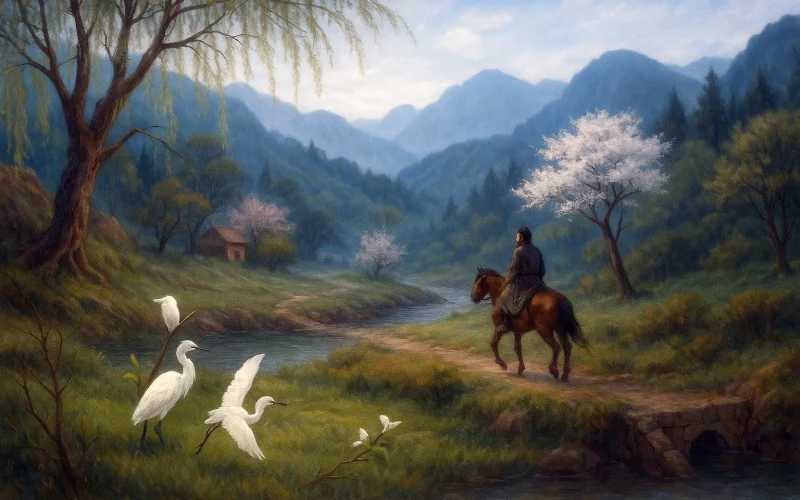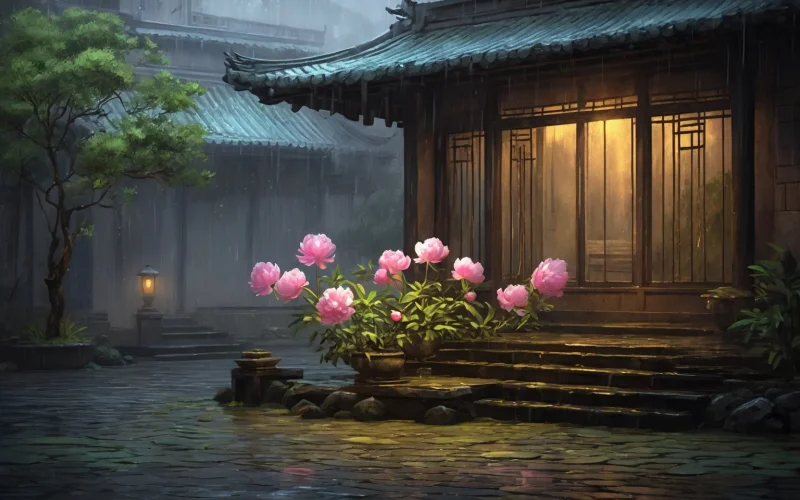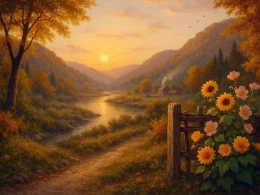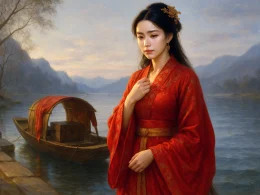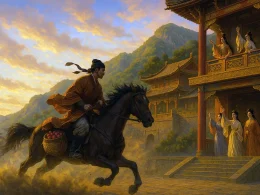Vermilion Cliff's willows yearn for spring breeze,
Plum blooms on Yu Ridge still bear snow's freeze.
You ride a lean horse southward—I recall,
But who knows a true dragon behind thrall?
My homeland is a landscape beyond compare,
When shall we share these hills with kindred care?
Choose white egrets or Green Plains without despair,
Thatched huts we'll build—but which site shall we dare?
Original Poem
「和符君俞卜邻」
杨万里
朱崖柳色欲春风,庾岭梅花尚雪容。
念子南归骑瘦马,只今谁解好真龙。
吾乡端是山水窟,何日来同丘壑胸。
白鹭青原不妨拣,诛茅结屋看何从。
Interpretation
Written by Yang Wanli for his friend Fu Junyu, this poem was likely composed during Yang's period of retreat in Jishui. At the time, he faced repeated setbacks in his official career and struggled with poor health, fostering a longing for a reclusive life amidst mountains and valleys. His deep friendship with Fu, rooted in shared ideals, is reflected in this work—both as a gesture of concern for his friend's return and an imaginative vision of their future together enjoying nature. Through poetry, Yang blends friendship, landscape, and life aspirations, revealing his unique spirit.
First Couplet: "朱崖柳色欲春风,庾岭梅花尚雪容。"
Zhūyá liǔ sè yù chūnfēng, Yǔlǐng méihuā shàng xuě róng.
Willows at Zhuya hint at spring’s approach;
Plum blossoms on Yuling keep their snow-kissed grace.
The opening contrast depicts willows heralding spring in the south versus plums retaining winter’s chill in the north, highlighting seasonal and geographical differences that metaphorically suggest life’s varied paths.
Second Couplet: "念子南归骑瘦马,只今谁解好真龙。"
Niàn zǐ nán guī qí shòu mǎ, zhǐ jīn shuí jiě hǎo zhēnlóng.
Thinking of you riding a lean horse southward;
Who now understands one who cherishes the true dragon?
Shifting from scene to emotion, this couplet conveys the hardship of Fu’s journey and laments the rarity of true appreciation. "True dragon" (真龙 zhēnlóng) symbolizes noble talent, praising Fu while expressing disappointment in societal blindness.
Third Couplet: "吾乡端是山水窟,何日来同丘壑胸。"
Wú xiāng duān shì shānshuǐ kū, hé rì lái tóng qiūhè xiōng.
My homeland is truly a haven of landscapes;
When will you come to share these valleys and hills?
Here, Yang directly extends an invitation, envisioning shared retreat in Jishui’s natural beauty. Mountains and waters represent not just scenery but spiritual solace, reflecting his desire for reclusion.
Fourth Couplet: "白鹭青原不妨拣,诛茅结屋看何从。"
Báilù qīng yuán bùfáng jiǎn, zhū máo jié wū kàn hé cóng.
Herons and green plains offer choices aplenty;
Thatch a cottage—where shall we begin?
The finale concretizes the vision: serene settings like "herons and green plains" (白鹭青原 báilù qīng yuán) idealize their future haven. The poet’s sincere invitation blends seamlessly with poetic imagery, uniting friendship and nature.
Holistic Appreciation
The poem progresses from contrasting landscapes to the friend’s journey and finally to an invitation for shared reclusion. Yang uses nature to mirror inner states: willows and plums symbolize temporal and worldly disparities, while the "lean horse" and "true dragon" illustrate Fu’s challenges and integrity. The latter half transforms lament into hope, envisioning valleys and hills as sanctuaries beyond worldly cares.
With plain yet profound language, the poem feels fresh and resonant. It is not merely a dedication but a lyrical meditation on friendship, nature, and life choices.
Artistic Merits
- Scene-emotion juxtaposition: The north-south contrast of willows and plums grounds abstract life experiences in tangible imagery.
- Emotional depth through metaphor: "Lean horse" and "true dragon" convey concern, admiration, and societal critique.
- Nature as idealistic refuge: The latter couplets celebrate landscape beauty, fusing reclusive yearnings with friendship.
- Unadorned yet suggestive language: Simple diction carries profound meaning, embodying Yang’s candid and lucid style.
Insights
This poem reminds us that friendship offers not only solace but also strength in adversity. By envisioning a shared "mountain-water haven" (山水窟 shānshuǐ kū), Yang expresses genuine care for his friend and his own longing for a natural, unhurried life. In modernity’s rush, we too might seek such spiritual refuge—a space to preserve authenticity and connection, untouched by worldly turbulence.
About the Poet
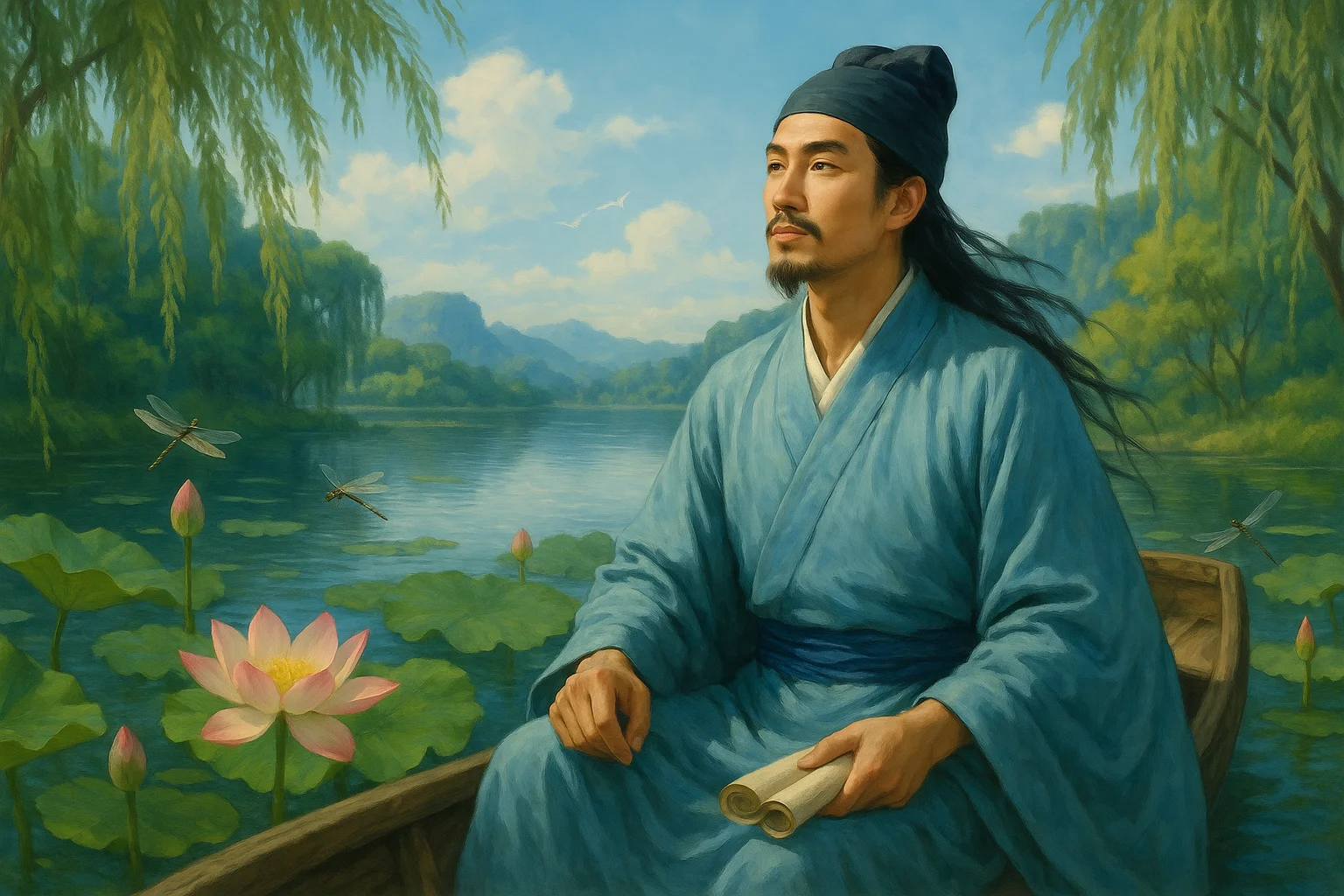
Yang Wanli (杨万里 1127 - 1206), a native of Jishui in Jiangxi, was a renowned poet of the Southern Song Dynasty, celebrated as one of the "Four Great Masters of the Restoration" alongside Lu You, Fan Chengda, and You Mao. He attained the jinshi degree in 1154 and rose to the position of Academician of the Baomo Pavilion. Breaking free from the constraints of the Jiangxi School of Poetry, he pioneered the lively and natural "Chengzhai Style," advocating for learning from nature and employing plain yet profound language. His poetry, often drawing inspiration from everyday life, profoundly influenced later schools of lyrical expression, particularly the Xingling (Spirit and Sensibility) School.






